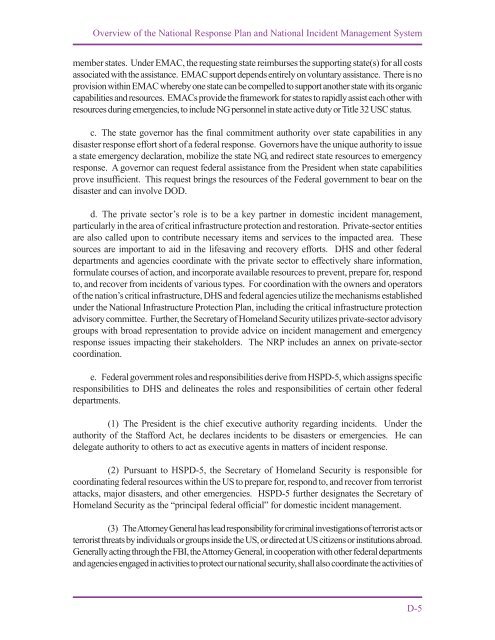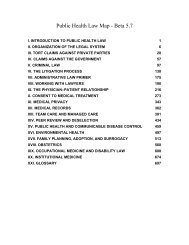JP 3-28, Civil Support - Federation of American Scientists
JP 3-28, Civil Support - Federation of American Scientists
JP 3-28, Civil Support - Federation of American Scientists
Create successful ePaper yourself
Turn your PDF publications into a flip-book with our unique Google optimized e-Paper software.
Overview <strong>of</strong> the National Response Plan and National Incident Management System<br />
member states. Under EMAC, the requesting state reimburses the supporting state(s) for all costs<br />
associated with the assistance. EMAC support depends entirely on voluntary assistance. There is no<br />
provision within EMAC whereby one state can be compelled to support another state with its organic<br />
capabilities and resources. EMACs provide the framework for states to rapidly assist each other with<br />
resources during emergencies, to include NG personnel in state active duty or Title 32 USC status.<br />
c. The state governor has the final commitment authority over state capabilities in any<br />
disaster response effort short <strong>of</strong> a federal response. Governors have the unique authority to issue<br />
a state emergency declaration, mobilize the state NG, and redirect state resources to emergency<br />
response. A governor can request federal assistance from the President when state capabilities<br />
prove insufficient. This request brings the resources <strong>of</strong> the Federal government to bear on the<br />
disaster and can involve DOD.<br />
d. The private sector’s role is to be a key partner in domestic incident management,<br />
particularly in the area <strong>of</strong> critical infrastructure protection and restoration. Private-sector entities<br />
are also called upon to contribute necessary items and services to the impacted area. These<br />
sources are important to aid in the lifesaving and recovery efforts. DHS and other federal<br />
departments and agencies coordinate with the private sector to effectively share information,<br />
formulate courses <strong>of</strong> action, and incorporate available resources to prevent, prepare for, respond<br />
to, and recover from incidents <strong>of</strong> various types. For coordination with the owners and operators<br />
<strong>of</strong> the nation’s critical infrastructure, DHS and federal agencies utilize the mechanisms established<br />
under the National Infrastructure Protection Plan, including the critical infrastructure protection<br />
advisory committee. Further, the Secretary <strong>of</strong> Homeland Security utilizes private-sector advisory<br />
groups with broad representation to provide advice on incident management and emergency<br />
response issues impacting their stakeholders. The NRP includes an annex on private-sector<br />
coordination.<br />
e. Federal government roles and responsibilities derive from HSPD-5, which assigns specific<br />
responsibilities to DHS and delineates the roles and responsibilities <strong>of</strong> certain other federal<br />
departments.<br />
(1) The President is the chief executive authority regarding incidents. Under the<br />
authority <strong>of</strong> the Stafford Act, he declares incidents to be disasters or emergencies. He can<br />
delegate authority to others to act as executive agents in matters <strong>of</strong> incident response.<br />
(2) Pursuant to HSPD-5, the Secretary <strong>of</strong> Homeland Security is responsible for<br />
coordinating federal resources within the US to prepare for, respond to, and recover from terrorist<br />
attacks, major disasters, and other emergencies. HSPD-5 further designates the Secretary <strong>of</strong><br />
Homeland Security as the “principal federal <strong>of</strong>ficial” for domestic incident management.<br />
(3) The Attorney General has lead responsibility for criminal investigations <strong>of</strong> terrorist acts or<br />
terrorist threats by individuals or groups inside the US, or directed at US citizens or institutions abroad.<br />
Generally acting through the FBI, the Attorney General, in cooperation with other federal departments<br />
and agencies engaged in activities to protect our national security, shall also coordinate the activities <strong>of</strong><br />
D-5

















